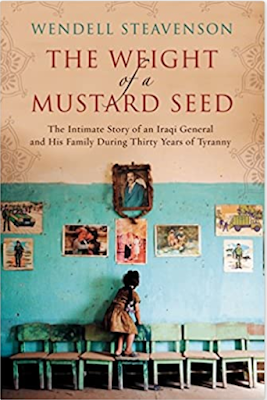Steavenson, Wendell, The Weight of a Mustard Seed, The Intimate Story of an Iraqi General and His Family During Thirty Years of Tyranny, New York: Collins, 2009
The Weight of a Mustard Seed, The Intimate Story of an Iraqi General and His Family During Thirty Years of Tyranny by journalist Wendell Steavenson is the story of General Kamel Sachet and his family and friends. General Sachet fought in the Iran-Iraq War and the Gulf War, and then served as governor of Maysan before he was executed by the government. Steavenson wanted to know why people like Sachet served the Baath, how it affected their morality and how they could live with themselves?
General Sachet was heavily invested in Saddam Hussein. He supported the Baath during the 1963 coup and in 1975 he joined the army and then the Special Forces. He became a hero during the Iran-Iraq War fighting in some of the largest battles. Even when he was arrested in 1983 for criticizing a decision he sent a petition to Saddam and was eventually released with no charges against him. The general then met with Saddam who gave him money, made him a general and gave him the 2nd Division to command. This only increased Sachet’s faith in the regime. The general never joined the Baath Party but he did believe in serving his country and his duty to the army, neither of which was shaken by the war. Steavenson interviewed several other Iraqi officers and generals and they all had the same attitude.
The Gulf War was the turning point. General Sachet told his wife Um Omar that the invasion of Kuwait was madness. He was then put in charge of defending Kuwait City. There he grew disgusted with the orders of Saddam’s cousin Ali Hassan al-Majid who was governor of Kuwait. Then when the conflict started he was ordered to retreat without a fight. Sachet believed this was the ultimate betrayal. The general was a soldier who wanted to fight to preserve the honor of the army and running away was a disgrace. When Sachet returned to his family in Baghdad he openly criticized Saddam. He was later retired and burned his uniform which he had cherished for years.
Sachet was not alone in his sentiments. Most of the other officers the author talked to also changed their opinion about Saddam over the Kuwait war. Many former regime members said they believed the Baath was good for defending the country from Tehran, but then screwed everything up with Kuwait. Steavenson found they had no real regret for serving a dictator. If not for the Gulf War they would have all been loyal to the end. Instead, they made excuses. The author wrote her interviewees would always complain about Saddam’s rule, and then say “but” they had to follow orders or that Saddam also did good for Iraq.
The Weight of a Mustard Seed wanted to know how Iraqis who served Saddam could live with themselves. The author believed that Sachet’s time as governor of Maysan provided an answer to that question. Sachet was known as a good governor who helped the common people. He went to a hospital for lepers once which had been completely forgotten by the central government and was in complete disrepair and had a new one built for the patients. This was also the time that Sachet became highly religious. This transformation began in the 1980s when he demanded his wife cover herself. By the 1990s he was building mosques and became highly devout. It went so far that people accused him of being a wahabi, the extreme religious sect found in Saudi Arabia. Steavenson believed that serving the people of Maysan was a form of redemption for the general and religion was an escape from Saddam who he had come to despise. Sachet was no longer going to have blind faith in the regime. Instead he would put all that energy into his faith.
I liked the questions Steavenson posed for those that served Saddam. Everyone she talked to believed in Saddam Hussein and General Sachet was no different. The Gulf War changed things. Some left Iraq and went into exile. Some put their heads down and continued to work for the government. Others like Sachet tried to make some amends. His unwillingness to go along with all of the demands that Saddam made of him led him to be executed in 1998. The Weight of a Mustard Seed is one of the few Western books to focus solely upon Iraqis and gives an interesting perspective upon their experiences under Baathist rule.
Link to all of Musings On Iraq’s book reviews listed by topic





No comments:
Post a Comment